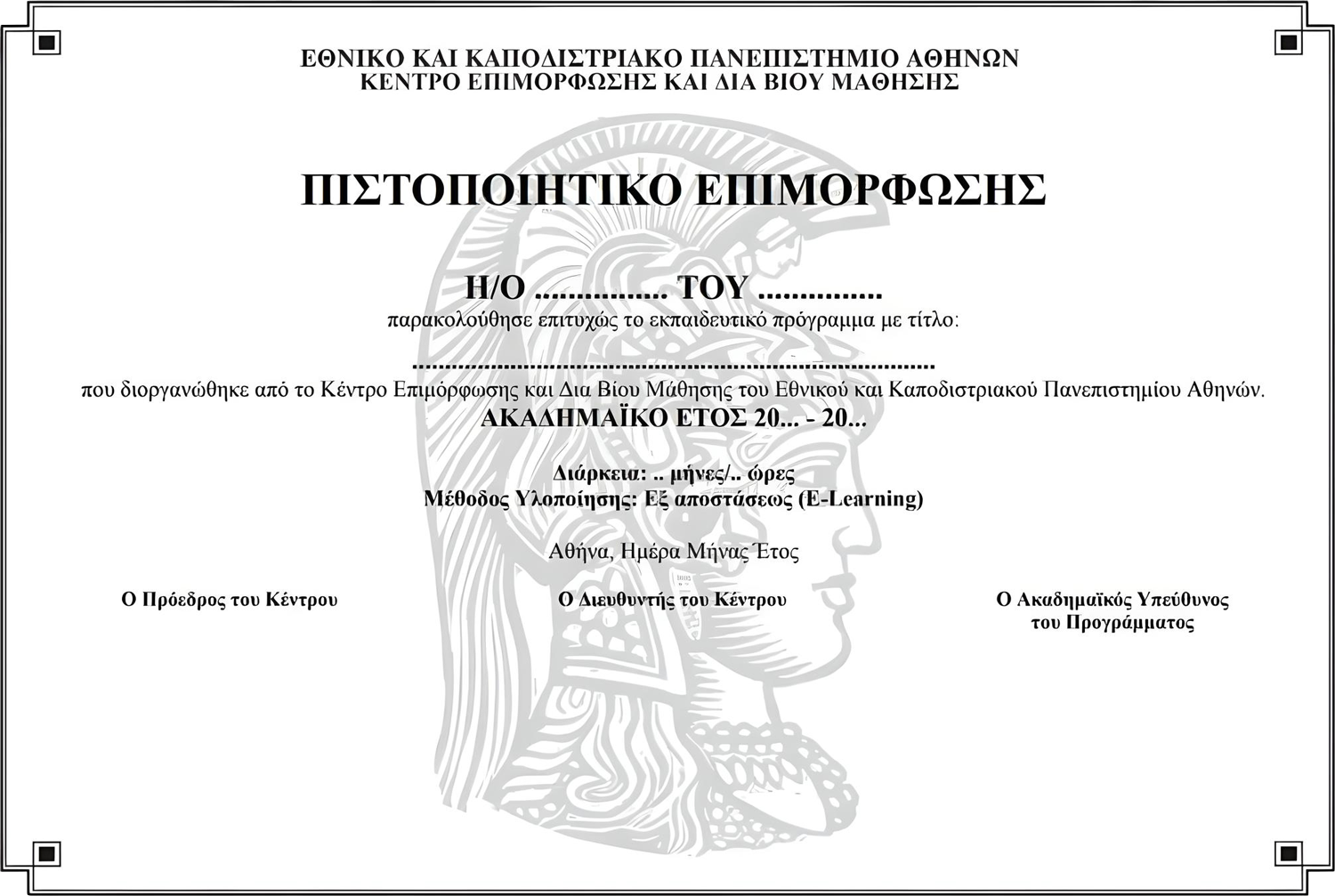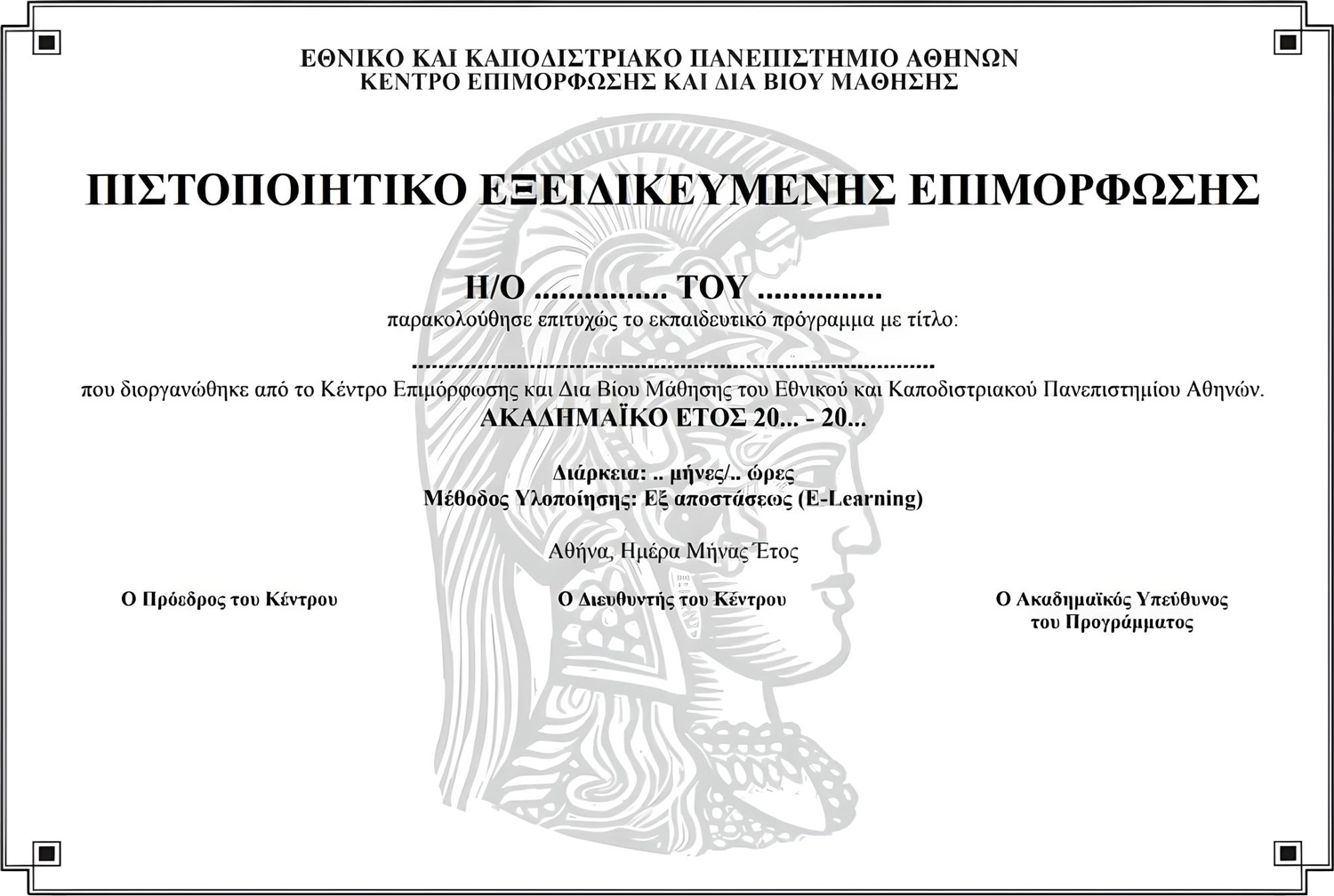Principles of Banking Management
-5% for Early Entry until 8/1/2025
Application until 27 Jan. 2025

-
Mode of Study
Distance Learning
-
Duration
1 Month
-
Credits
3.2 ECVET
-
Tuition Fees
150€ (without discount)
Program Objectives
Banks are institutions that accept deposits from the public, provide credit, and offer various financial services as permitted by their operating license.
Additionally, banks operate as businesses with the objective of maximizing shareholder wealth, making banking management fundamentally about profit-seeking and risk management.
The goal of the program is to provide theoretical and practical training in the core principles of banking management, equipping participants with the necessary knowledge to understand and manage the complexities of modern banking.
The program offers a comprehensive overview of key frameworks and tools in contemporary banking, covering:
- The transformational functions of banks (size transformation, maturity transformation, and risk transformation).
- Asymmetric information, along with challenges such as adverse selection and moral hazard.
- Different types of banking, central banking, banking regulation and supervision, and the various risks banks face, including credit risk, interest rate risk, and liquidity risk.
Training Cycle Calendar
-
27/1/2025
Application Deadline
-
30/2/2025
Program Start Date
-
4/2025
Certificate Award
During Christmas, Easter, and the month of August, the Executive Program is temporarily suspended.
Who Should Attend
This program is designed for individuals who wish to:
- Expand their knowledge and skills in banking.
- Advance their careers by developing fundamental banking competencies.
- Acquire essential knowledge to pursue a formal postgraduate degree in the future.
Skills You Will Gain
By completing the Executive Program in Principles of Banking Management, participants will gain valuable insights and abilities. A graduate will be able to:
Explain the key transformation functions of banks (size, maturity, and risk transformation).
Define adverse selection and moral hazard in banking services.
Classify and describe different types of banking.
Outline the main services provided by banks.
Identify the core functions of central banks.
Describe a bank’s balance sheet.
Understand different forms of banking regulations.
Recognize the components of the financial safety net.
Course Modules
Total Duration: 1 Month Teaching Hours: 80
Banking Fundamentals
1 WeekThe Financial System
Role of Banks
Asymmetric Information, Adverse Selection, and Moral Hazard
Theories of Financial Intermediation
Key Features of Banks
1 WeekBanking Services
Types of Banking
Central Banking
Bank Balance Sheets
Banking Regulation and Supervision
1 WeekTypes of Banking Regulations
The Financial Safety Net
Constraints of Banking Regulation
The Basel Committee on Banking Supervision
Banking Risks
1 WeekMajor Types of Banking Risks
Credit Risk
Interest Rate Risk
Liquidity Risk
Other Banking Risks
Discount Categories
-
Category A – 10% Discount
Unemployed individuals
Persons with disabilities
Employees of universities and research centers
Groups of three or more participants from the same organization
-
Category B – 5% Discount
Early registration up to one month before the application deadline
Full tuition payment before the program start date
Please note that the above discount categories cannot be combined. If a participant qualifies for both categories, only the higher discount will be applied.
Certificate
Successful completion of the program leads to the award of a certificate, which includes the program title and the exact number of training hours. Depending on the program, the awarded certificate may be:
Europass / ECVET Certificate Supplement
The Europass / ECVET Certificate Supplement is a document that accompanies the training or specialized training certificate awarded upon program completion.
It provides a detailed description of the training program, including the course modules, duration, admission requirements, assessment process, learning outcomes, and the skills and competencies acquired.
It enhances the value of the awarded training or specialized training certificate and can be used by graduates for employment opportunities, career advancement, or further studies.
Methodology
-
Training Method
Distance learning (e-learning) through an interactive platform.
-
Platform Features
User-friendly, includes e-books, interactive content, multimedia, self-assessment, and livestreaming.
-
Structure
Learning modules with study guidelines.
-
Content
Objectives, outcomes, keywords, introduction, main text, examples, case studies, exercises, audiovisual material, slides, summary.
-
Support
Continuous communication and livestream meetings with instructors.
-
Assessment
Self-assessment, exercises, and final evaluation with multiple-choice questions and the option for retaking.
Contact
-
210 368 9430
Executive Programs Secretariat, Monday to Friday (11:00 – 17:00)
-
executive-programs@econ.uoa.gr
Contact via email
-
Sofokleous 1 Street
Executive Programs Secretariat, Monday to Friday, 11:00 – 17:00, at Grypareion Megaron, Sofokleous 1, 5th floor, Office 518, Athens, Postal Code 10559


